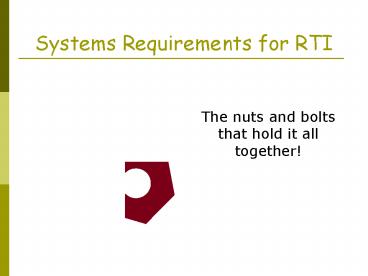Systems Requirements for RTI - PowerPoint PPT Presentation
1 / 22
Title:
Systems Requirements for RTI
Description:
Daisy's teacher does. His/her best to differentiate. instruction and keeps. anecdotal data ... Daisy participates in the. general core curriculum. EBIS Team ... – PowerPoint PPT presentation
Number of Views:54
Avg rating:3.0/5.0
Title: Systems Requirements for RTI
1
Systems Requirements for RTI
- The nuts and bolts that hold it all together!
2
Objectives
- Sample of the BIG IDEAS of RTI
- Prompt comparisons to current practice
- Prime participants for more details later
3
Historical v. RTI Approaches
- Who identifies struggling students?
- Who develops interventions?
- Who implements interventions?
- Which is promoted A culture of teamwork or a
culture of parallel programs?
4
Daisy participates in the general curriculum
Daisys teacher does His/her best to
differentiate instruction and keeps anecdotal
data
Daisy isnt doing well
Teacher tries again
Daisy improves
Daisy doesnt improve
The historical approach
Pre-referral team reviews what teacher has
tried
Resumes regular program
Teachers effort is deemed sufficient
Teacher is told to try again
Special Education referral is initiated by the
teacher
5
Daisy participates in the general core
curriculum
EBIS Team reviews screening data and places
Daisy in group intervention
Daisy isnt doing well
Daisy probably recycles
The RTI Approach
Daisy improves
Daisy doesnt improve
EBIS Team determines individually designed
intervention
Resumes general program
Daisy may recycle
Daisy improves
Daisy doesnt improve
Improvement is good and other factors are
suspected as cause
Intervention is intense and LD is suspected
Special Education referral is initiated
6
The Historical v. RTI Approach
- Who identifies struggling students?
- Who develops interventions?
- Who implements interventions?
- Which is promoted A culture of teamwork or a
culture of parallel programs?
7
Your assignment. . .
- Read How the EBIS Team Process Works
- When you have completed the reading do one of the
following on chart paper - Report out an idea that was new and interesting
- Ask a clarifying question
8
System RequirementsAn Overview
- Leadership at all levels
- Teaming
- Use of a research based core reading curriculum
- Universal screening
- Implementation of research based interventions
- Progress monitoring
- Policy and procedure development
(standardization) - Professional development including fidelity of
implementation.
9
1 Leadership
- District Level
- AND
- School Level
10
2 Teaming
- Collaboration is the key Membership might
include - Principal
- Classroom Teachers
- Specialists
- School Counselor
- School Psychologist
11
Your Assignment. . .
- Look on page 23 of the EBIS document.
- Do a self assessment on your school/district
- Discuss at your table.
- It is OK to be at ANY level. Implementing large
changes to a school district is an ongoing
process which will last years.
12
3 Research- Based CORE Program
- RTI is predicated on effective, research-based
programs that include the BIG 5 components of
reading - Phonemic Awareness
- Phonics
- Fluency
- Vocabulary
- Comprehension
13
Teaching ReadingA View from 1980
- Reading is a natural process
- An enriching environment is the most important
factor - Discreet skills cannot be targeted (and even if
they could, they shouldnt be) - Good readers dont decode they rely on context
- Love of reading is the ultimate goal
14
Differences in Learning to ReadEstimates from
NICHD research (NC Dept. of Public Education)
15
More about the CORE
- Important Facts
- Students can not be identified as LD if their
difficulty is due to a lack of instruction in the
BIG 5. - Research-based program must be implemented as
designed (fidelity)
16
4 Universal Screening
- Assessment and RTI
- Universal screening must occur for ALL students
at least three times per year (fall, winter,
spring) - Procedures must identify which students are
proficient (80) and which are deficient (20). - Procedures will lead to data for decision making
about - How to create instructional change for ALL
- Which students need additional intervention
17
5 Interventions must
- Be research-based
- Increase the intensity of instruction
- More time
- Smaller groups
- Focus on essential skills
- Be regularly monitored
- Be delivered with fidelity
- Be coordinated at the district level
- Include ongoing training
- pgs. 24-27
18
6 Progress Monitoring
- Progress monitor all students needing additional
intervention - Frequency is determined by district decision
rules - Monthly
- Twice per month
- Weekly
- Twice per week
19
More on Progress Monitoring
- Establish aimlines
- Make changes as needed based on progress
monitoring data - Review the EBIS Decision Rules pgs. 5-7
20
7 Policy and Procedure Development
(Standardization)
- Districts must adopt common procedures for
doing this work - Decision Rules
- Forms
- SpEd Procedures
- Think of RtI as a standardized test
21
8 Professional Development
- Must happen in each of the following areas
- Core curriculum and instruction
- Interventions
- Teaming
- Data-based decision making
- Special Education
22
System RequirementsAn Overview
- Leadership at all levels
- Teaming
- Use of a research based core reading curriculum
- Universal screening
- Implementation of research based interventions
- Progress monitoring
- Policy and procedure development
(standardization) - Professional development including fidelity of
implementation.































